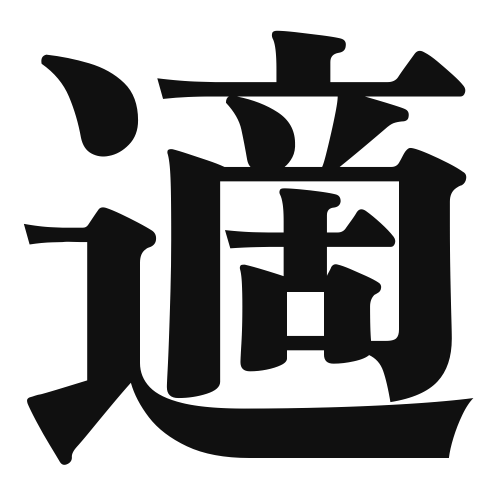1. Overview of Meaning
The kanji “適” (teki) generally means “suitable,” “appropriate,” or “fitting.” It conveys the idea of something being well-matched or well-suited for a particular purpose or situation.
2. Formation and Radical
Formation of the Kanji: The kanji “適” is a compound character (会意文字) that combines elements to convey its meaning. It consists of the radical “辶” (which relates to movement) and the character “適,” which can imply a sense of alignment or suitability.
Radical: The radical for “適” is “辶,” which is associated with movement or travel, suggesting the idea of something being in the right place or context.
3. Examples of Usage
Common Words and Phrases: Some frequently used words that include “適” are:
- 適切 (tekisetsu) – appropriate, suitable
- 適応 (tekiou) – adaptation
- 適度 (tekido) – moderate, appropriate level
Example Sentences in Daily Conversation:
- この服は私に適切です。 (Kono fuku wa watashi ni tekisetsu desu.) – This outfit is suitable for me.
- 彼は新しい環境に適応するのが得意です。 (Kare wa atarashii kankyou ni tekiou suru no ga tokui desu.) – He is good at adapting to new environments.
4. Synonyms and Antonyms
Similar Kanji: A kanji with a similar meaning is “合” (ai), which means “to fit” or “to match.” However, “合” often emphasizes the act of coming together, while “適” focuses more on suitability.
Opposite Kanji: An antonym for “適” is “不適” (futekiteki), which means “inappropriate” or “unsuitable.”
5. Cultural and Historical Background
Relation to Japanese Culture: The concept of “適” is significant in Japanese culture, where harmony and appropriateness are valued in various aspects of life, including social interactions and aesthetics.
Proverbs and Idioms: One common saying is “適材適所” (tekizai tekisho), which means “the right person in the right place,” emphasizing the importance of suitability in roles and responsibilities.
